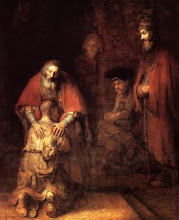There was blood on the ground
You could hear a woman cry
In the alleyway that night
On the streets of David's town
And the stable was not clean
And the cobblestones were cold
And little Mary full of grace
With the tears upon her face
Had no mother's hand to hold..."
Our own Christmas season has not been so neat and tidy this year either. Coming on the heels of my dad's death in June (via lung cancer) and the earlier news during the summer of 2007 that my mother had been diagnosed with breast cancer that had spread to other areas of her body, we found out this month that Sabrina's mom has been diagnosed with stage four oral cancer. Initially, the doctors had considered a surgery where they would essentially cut out her tongue, then replace it with muscle from her thigh. They have since decided to forgo that drastic step, and treat the cancer with chemo and radiation. She now has a feeding tube in her stomach and they are treating other complications at the hospital here in Portland. On top of that, there are other issues I won't go into here which make the family dynamics challenging, to say the least.
Spiritually speaking, we have been stretched to move beyond theoretical love to practical love each and every day. The Lord continues to work on us and others, teaching us to die to ourselves and take up our cross daily. In that light, I wanted to share some fantastic insights I've been gleaning from William L. Lane's superb commentary on the Gospel of Mark, particularly as he addresses the section in Mark 8:34-9:1:
"The humiliation of the Messiah, announced in Ch. 8:31, is the mysterious prototype of that of the Christian. But even as Jesus spoke of death followed by resurrection, his followers may look beyond a pagan tribunal to the tribunal of the Son of Man where loyalty to Jesus will be honored by vindication. This unit amounts to a call for complete and confident identification with Christ...Jesus stipulated that those who wish to follow him must be prepared to shift the center of gravity in their lives from a concern for self to reckless abandon to the will of God. The central thought in self-denial is a disowning of any claim that may be urged by the self, a sustained willingness to say 'No' to oneself in order to say 'Yes' to God. This involves a radical denunciation of all self-idolatry and of every attempt to establish one's own life in accordance with the dictates of the self. This demand is reinforced and intensified by the horrifying image of a death march. Bearing the cross was not a Jewish metaphor, and Jesus' statement may have sounded repugnant to the crowd and the disciples alike. The saying evokes the picture of a condemned man going out to die who is forced to carry on his back the cross-beam upon which he is to be nailed at the place of execution. By the time Mark prepared the Gospel this had become a cruel reality, both for Jesus and the Church. Jesus' words were a sober caution that the commitment for which he asked permitted no turning back, and if necessary, a willingness to submit to the cross in pursuance of the will of God. His followers must be prepared to die, for they share in the same veiledness that permits his own humiliation. The call to follow Jesus, which recapitulates the action in which self-denial and cross-bearing are to be manifested, provides a vivid reminder that suffering with the Messiah is the condition of glorification with him (Rom. 8:17)."





















